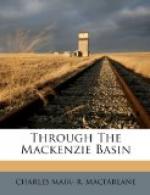We were now on the return to Pelican Landing, with but few incidents to note by the way, aside from those already recorded. But having occasion to take a declaration at a cabin on our passage along the first lake, we had an opportunity of visiting a hitherto unobserved stratum of Wahpooskow’s society.
The path to the cabin and its tepees led up a steep bank, beaten as hard as nails and as slippery as glass; nevertheless, by clutching the weeds which bordered it, mainly nettles, we got on top at last, where an interesting scene met the eye.
This was a half-breed family, the head of which, a shrivelled old fellow, was busy making a paddle with his crooked knife, the materials of a birch-bark canoe lying beside him—and most beautifully they make the canoe in this region. His wife was standing close by, a smudged hag of most sinister aspect; also a son and his wife. On stages, and on the shrubs around, were strewn nets, ragged blankets, frowsy shawls, and a huddle of other shreds and patches; and, everywhere else, a horde of hungry dogs snarling and pouncing upon each other like wolves. Filth here was supreme, and the mise en scene characteristic of a very low and very rare type of Wahpooskow life indeed—a type butted and bounded by the word “fish.” An attempt was made to photograph the group, but the old fellow turned aside, and the old woman hobbled into the recesses of a tepee, where we heard her muttering such execrations in Cree as were possible to that innocent tongue. The hands of the woman at the cabin door were a miracle of grime and scrofula. Her sluttish locks, together with two children, hung around her; one of the latter chewing a muddy carrot up into the leaves, an ungainly little imp; the other was a girl of singularly beautiful features and of perfect form, her large luminous eyes of richest brown reflecting the sunlight from their depths like mirrors—a little angel clad in dirt. Why other wild things should be delicately clean, the birds, the fishes she lived on, and she be bred amidst running sores and vermin, was one of the mysteries I pondered over when we took to our canoes. For such a pair of eyes, for those exquisite features, some scraggy denizen of Vanity Fair would have given a king’s ransom. Yet here was a thing of beauty, dropped by a vile freak of Nature into an appalling environment of filth and ignorance; a creature destined, no doubt, to spring into mature womanhood, and lapse, in time, into a counterpart of the bleared Hecate who mumbled her Cree philippics in the neighbouring wigwam.
On our return trip some detours were made, one of which was to the habitation of another half-breed family at the foot of Sandy Lake, themselves and everything about them orderly, clean and neat; the very opposites of the curious household we had visited the day before. They had a great kettle of fish on the fire, which we bought, and had our dinner there; being especially pleased to note that their dogs were not starved,




